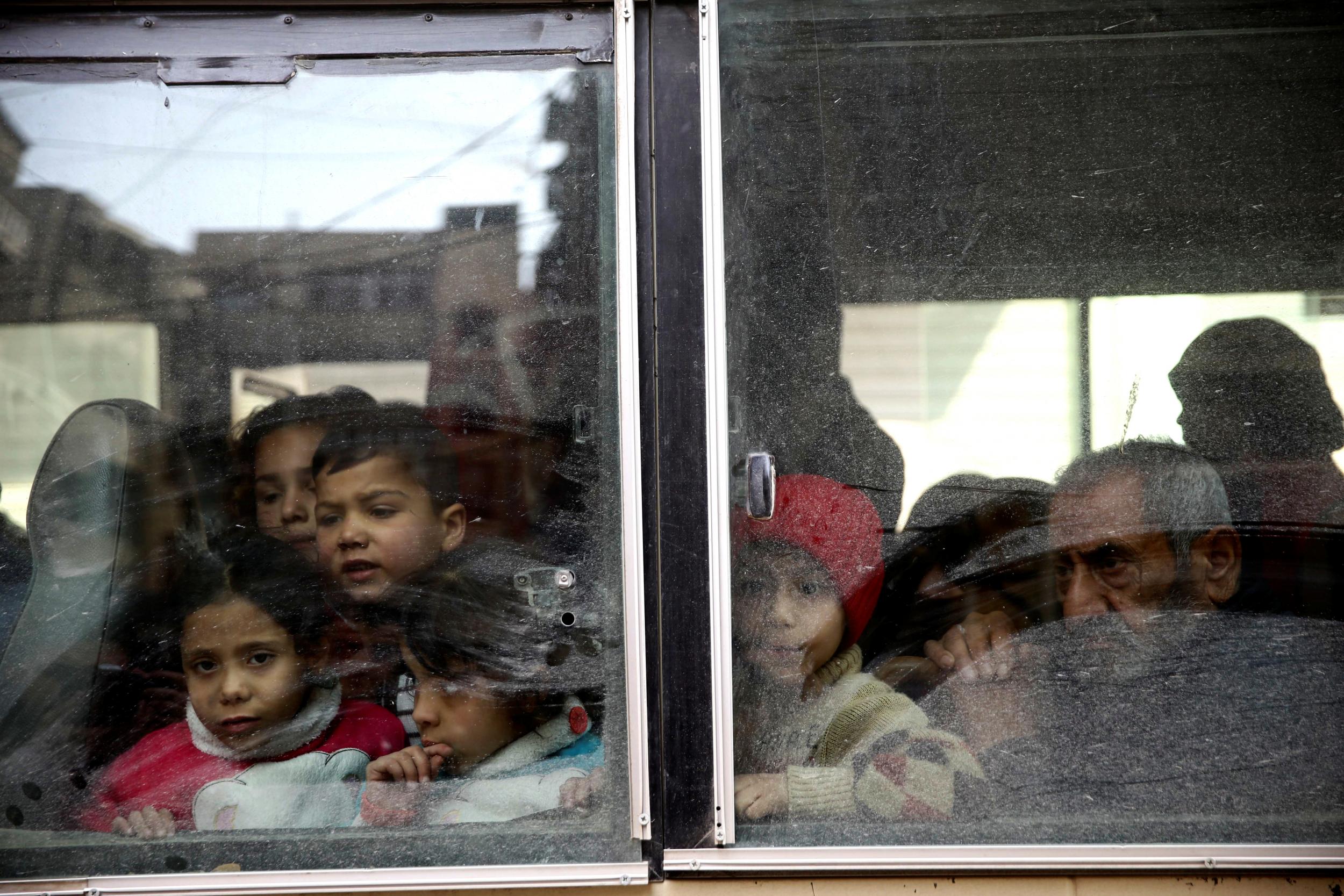Syria civil war: Civilian evacuations from besieged Eastern Ghouta begin as rebels vow to keep fighting
‘I don’t want to leave eastern Ghouta. My children grew up here, it’s my home’: families pray international community will intervene to end violence before they have to flee their homes

Your support helps us to tell the story
From reproductive rights to climate change to Big Tech, The Independent is on the ground when the story is developing. Whether it's investigating the financials of Elon Musk's pro-Trump PAC or producing our latest documentary, 'The A Word', which shines a light on the American women fighting for reproductive rights, we know how important it is to parse out the facts from the messaging.
At such a critical moment in US history, we need reporters on the ground. Your donation allows us to keep sending journalists to speak to both sides of the story.
The Independent is trusted by Americans across the entire political spectrum. And unlike many other quality news outlets, we choose not to lock Americans out of our reporting and analysis with paywalls. We believe quality journalism should be available to everyone, paid for by those who can afford it.
Your support makes all the difference.The largest rebel group in besieged eastern Ghouta has vowed to keep fighting, even as the Syrian government pushes on with an assault that has captured more than half of the rebel enclave.
“Our revolutionary ideology does not allow us to sell the blood of the holy warriors who liberated Ghouta,” Hamza Bayraqdar, the Army of Islam’s chief military spokesperson, said in a video posted online on Tuesday.
“We will stay in Ghouta and defend it.“
The announcement comes as Syrian President Bashar al Assad’s forces advanced into the rebel district, capturing more than half of the territory of farms and towns that the opposition has held since 2012. Rebels have repeatedly denied they have been in talks which could see fighters and their families bussed to opposition-held Idlib province in the northwest as part of an amnesty deal similar to Aleppo and Daraya.
A Russian-backed Syrian government assault on Ghouta launched last month has caused more than 1,000 deaths and injured more than 6,000 people, according to monitors and medical charities. The violence is some of the worst of Syria’s seven-year-old conflict to date.
The UN says up to 400,000 people remain in the besieged areas, including the town of Douma.
While appeals for all parties to adhere to a UN resolution demanding a ceasefire have fallen on deaf ears, for the first time on Tuesday a total of 35 people in need of urgent medical treatment and their chaperones were escorted out of the area safely.
Deana Lynn, an American woman living in Douma with her husband, eight children and four children, told The Independent that her family and many others have been using basements to hide from shelling and bombing over the last few weeks.
There were fewer fighter planes and strikes on the town on Tuesday, she said, probably as a result of the evacuations - but like many in the area she didn’t know how long the arrangement would last.
Even as she spoke the thud of an air strike she said was from a Russian plane could be heard in the background, ending the brief respite. A baby began to cry.
Elsewhere in the Syrian capital, the military said it had seized a southern suburb after an evacuation deal which saw 1,000 people bussed to Idlib, the last major rebel stronghold, in the country’s northeast.
The evacuees included some 300 militants from the extremist Ajnad al-Sham faction and their families.
Ms Lynn says she hopes the US and international community can exert pressure on Moscow and Damascus so that her family could avoid a similar fate.
Regardless, everyone in her family has a small bag ready in case they have to flee at short notice.
“I don’t want to leave eastern Ghouta. My children grew up here, it’s my home, this is the place they know.
“I think people in general they don’t want to leave or become displaced. What would they do in Idlib? They would have to look for a home or they’d have to leave for Turkey or Europe.
"We hope it won’t happen to us… I just hope we’ll be safe."
Subscribe to Independent Premium to bookmark this article
Want to bookmark your favourite articles and stories to read or reference later? Start your Independent Premium subscription today.
Join our commenting forum
Join thought-provoking conversations, follow other Independent readers and see their replies
Comments